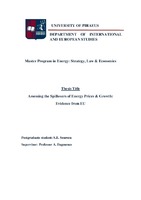Assessing the spillovers of energy prices & growth: evidence from EU

Προβολή/
Λέξεις κλειδιά
Economic growth ; Electricity prices ; European Union ; Cointegration ; Causality ; Long-run equilibriumΠερίληψη
The aim of this thesis is to examine the long-run relationship among the energy
prices and the economic growth within the EU framework using time series analysis. On the
basis of cointegration and Error-Correction Mechanisms the prickly issue of causality among
the real GDP and the energy prices is assessed. Furthermore, the model includes as
explanatory variables the energy consumption and the intensity. Analytically, the study
develops the Engle-Granger 2-step procedure as well as the Johansen’s methodology for the
purpose of a Vector-Error Correction Model. Delving into the causal effects Wald tests and
Impulse-Response Functions are employed. Finally, the thesis proceeds to a Cholesky
Forecast-Variance Decomposition Analysis for the sake of estimating the impact of energy
prices, of energy consumption and that one of intensity on the real GDP. Evidence on
conservation hypothesis is observed on the case of real European GDP and residential
electricity prices, whereas growth hypothesis is entailed with respect to industrial electricity
prices and real output. In fact, household electricity sector exhibits the highest level of
influence; industrial electricity price and crude oil price can also ″Granger cause″ residential
electricity prices in the EU. Signs of feedback hypothesis concern the final energy
consumption and the residential electricity price. Though their significance at 10% level poses
limits over the findings’ accuracy. Finally, the European GDP is strongly endogenous in the
short-run whereas shocks from the other aggregates are permanent and expand their leverage
over the course of time.


